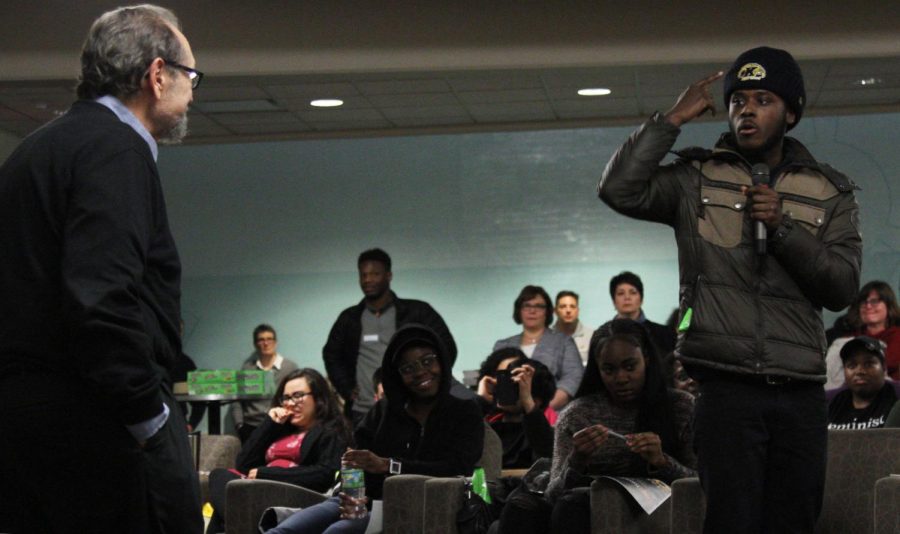Students engage in open political dialogue during Trump KENTtalk
January 31, 2017
Kent State students gathered in the Tri-Towers lobby Tuesday night for the fifth installment in the KENTtalk series, ‘Let’s Talk Trump: Understanding Both Sides of the Vote.’
The goal of the KENTtalk was to create a civil platform for people on both sides of the political aisle to discuss their differences and opinions.
Anthony Harris, senior economics major, was excited about the event.
“I’d hope that in meeting people who are not like you, in a friendly environment, that you will understand the idea,” Harris said. “We tend to see each other as one of two things: we see each other as either the ingroup — my core group of friends — people that have the same views as me, people that have the same opinions as me; and the out group, which is all those others.”
Through the course of the evening, the conversation centered mostly on the recent executive order preventing travel from seven Middle Eastern countries, including Iraq, Iran, Somalia, Yemen, Syria, Libya and Sudan.
“I am analyzing the difference between what the policy actually says and what people think it says. I’m here to get an understanding of how people have interpreted his words, rather than what his words actually are,” Harris said.
He discussed the current divisions in modern politics.
“In the American political system, you see this a lot. You see the Democrats who say, ‘all Republicans are just like this’ and you’ll see the Republicans form up and say ‘all Democrats are just like that,’ and they stay within their party. I’m hoping that being in a place like this, where it’s very hard to pin down the exact location of someone, will allow people to open their mind and ingest actual information,” Harris said.
The room filled quickly, leaving only standing room for many in attendance.
Nico Rushh, sophomore philosophy and psychology double major, reflected positively on the evening.
“Through communication and through understanding other people’s identities and experiences, that’s how we grow, and that’s how we learn and that’s how we come together as a unit, to then better ourselves and to then make America great,” Rushh said.
Although Rushh may have not agreed, they acknowledged the importance of unity and listening to those who may have different opinions.
“A lot of Trump supporters or people who identify themselves with him have the same conscious thought that there’s something wrong and there’s something we need to fix. No matter how rude or ignorant the view is, you should still take time to listen because then by you just getting up and arguing with someone, then you don’t get to hear their point,” Rushh said.
They acknowledged the importance of continuing this dialogue: to create more comfort in speaking up for those who were hesitant.
“A lot of people choose not to speak out because then you have that face-to-face interaction so then people who have the opposing view feel like they can’t speak on it,” Rushh said.
Kent State sociology professor Richard Serpe moderated the evening. He reflected on his experience, holding the student participants in high regard.
“I was very pleased,” Serpe said. “I think this could’ve gone for another two hours. The engagement in the people here was encouraging. What I heard today was a lot of hope, and I heard a lot of empowerment from people believing they have some ways of helping themselves and in the process helping others, making our communities better.”
The importance of civility and participation was the most prevalent lesson throughout the talk.
Serpe concluded the evening by relating Kent State students to his own activism and criticism of younger generations.
“What I heard today, different language, different topics, but the same commitment, the same engagement as people talked about in the ’60s,” he said.
“There’s nothing wrong with young people today. Their issues are different. Their challenges are different,” Serpe said. “They’re going to act differently than us in our 60s because their view is different than ours, their future is different than ours.”
Caelin Mills is the student politics reporter, contact her at [email protected].












